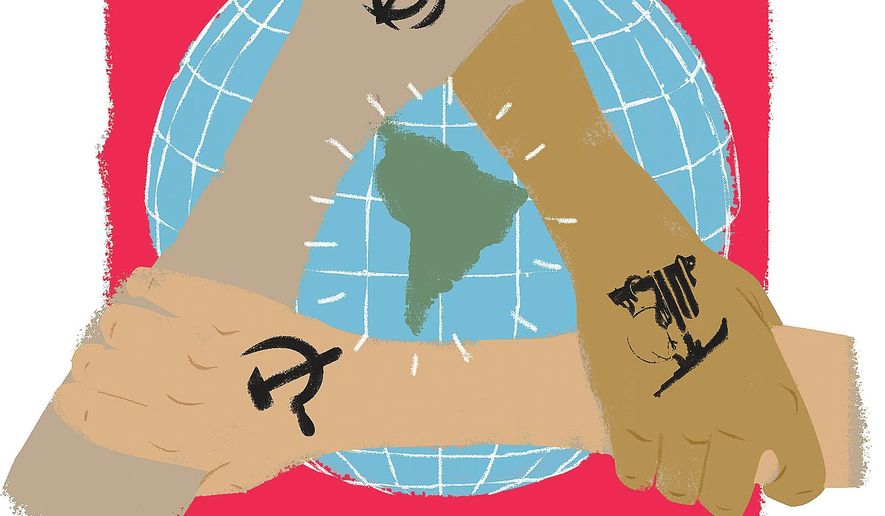OPINION:
At the U.N. last week, President Trump had harsh words for the “socialist dictatorship” that has impoverished Venezuela. He railed against “Islamist extremism” and “radical Islamic terrorism,” the former a supremacist ideology, the latter a weapon being used to mass-murder Muslims, Christians Yazidis, Jews and Hindus. He took note, too, of the threat posed by “international criminal networks” that “traffic drugs, weapons, people.”
What may not have occurred to Mr. Trump or most of his audience: the extent to which these evils are now being combined.
No one personifies this poisonous cocktail better than Tareck El Aissami, Venezuela’s 43-year-old vice president. Mr. El Aissami comes from a Lebanese-Syrian family with ties to Shia jihadi groups in Iraq. He also has been linked to a list of South American drug traffickers. Despite that, or perhaps because of it, he was appointed to the No. 2 government job in January by Venezuela’s dictator, President Nicolas Maduro.
One month later, the U.S. Treasury Department sanctioned Mr. El Aissami, saying he “played a significant role in international narcotics trafficking.” At least some of his assets — estimated at around $3 billion — were frozen.
Investigators also revealed that he had issued hundreds of Venezuelan passports to members of Iran’s Islamic Revolutionary Guard Corps and to operatives of Hezbollah, Iran’s Lebanon-based international terrorist proxy. That may be one of the reasons Mr. Trump on Sunday added Venezuela to the list of countries from which immigrants and visitors should be restricted.
Penetrating Latin America has been an Iranian and Hezbollah project for decades. They have been recruiting allies and agents in the Lebanese Shia diaspora communities, setting up “cultural centers” and mosques, establishing media outlets and “educational” institutions, sending missionaries to preach and convert, and selecting individuals for indoctrination and training in Iran.
Terrorism is another weapon in their arsenal. In 1992 the Israeli embassy in Buenos Aires, Argentina, was bombed. Two years later, the target was AMIA, a Jewish cultural association. More than a hundred people were killed in the two attacks.
Argentine prosecutor Alberto Nisman spent years investigating. In 2013, he published a 502-page indictment accusing Iran of establishing terrorist networks in countries throughout the hemisphere. He presented evidence pointing to Mohsen Rabbani, formerly Iran’s cultural attache in Argentina, as the mastermind behind both the networks and the Buenos Aires attacks. Other senior Iranian officials were found to be deeply involved as well.
By early 2015, Mr. Nisman’s had prepared a second report, one that implicated then-President Cristina Fernandez de Kirchner in “a plan to illegally aid and fraudulently exonerate the Iranian suspects” responsible for the attacks. But on Jan. 18, hours before Mr. Nisman was to present his evidence to Argentine lawmakers, he was murdered.
Over the weekend, a seven-month-long Argentine police investigation confirmed that conclusion, ruling out claims (initially by Mrs. Kirchner, among others) that he had committed suicide. No one has yet been brought to justice, though under Argentina’s post-Kirchner government, that’s not impossible.
My colleague Emanuele Ottolenghi, a senior fellow at the Foundation for Defense of Democracies, has been researching Iranian and Hezbollah penetration of Latin America. In May, he testified before the Senate Foreign Relations Committee, detailing the growing cooperation between “Islamic terror networks” and “violent drug cartels.” Such alliances, he noted, are often facilitated by “corrupt political elites” that provide Hezbollah’s trafficking networks “safe harbor.”
He told the legislators that Hezbollah now “plays a central role in a new landscape where drug and human trafficking, gun running, illicit cigarette trade, trade-based money laundering, and terror financing can no longer be treated as distinct phenomena.”
Instead, Hezbollah’s infrastructure and activities should be understood as “an integral part” of a comprehensive and long-term strategy to “export” Iran’s Islamic Revolution to the Western Hemisphere and establish forward operating bases to be used against the United States.
The most notorious Latin American haven for terrorists and organized crime figures is the Tri-Border Area (TBA), where Argentina, Brazil and Paraguay meet. The U.S. State Department’s annual report on terrorism last year noted that the Paraguayan slice of the TBA, in particular, “continued to be attractive to individuals seeking to engage in terrorist financing.”
Less well known: Cuba, a bastion of communist atheism that prohibits Christian proselytizing, takes a more lenient attitude toward Iran’s brand of Islam. Last year, Mr. Ottolenghi identified both an Iranian-backed Shia cultural center and a Shia mosque in Havana. Cuban converts are being sent to other Latin American countries to spread Iran’s revolutionary theology.
The Colombian government recently concluded a “peace deal” that legitimizes and awards political power to FARC, the far-left guerrilla group that has been waging a civil war since 1964. No one should be surprised if Hezbollah — with which FARC has long cooperated on arms deals, drug trafficking and money laundering — benefits. Iran, too, of course.
The growing socialist-Islamist-narco-terrorist alliance south of the border represents a clear and present danger. Nevertheless, as Mr. Ottolenghi told Congress, Washington has yet to formulate “a coherent foreign policy that recognizes the importance of Latin America as a key arena of competition with Iran and puts in place the needed resources to blunt Iranian and Hezbollah threats.”
In addition, “our limited intelligence capabilities make it difficult to fully assess the amount of terrorist financing generated in Latin America, or understand the scope of possible criminal-terrorist collaboration.”
That last comment was made two years ago by the commander in charge of U.S. Southern Command. Today, Gen. John F. Kelly serves as chief of staff to President Trump. So perhaps, sooner or later, this maturing threat will get the attention it so richly deserves.
• Clifford D. May is president of the Foundation for Defense of Democracies and a columnist for The Washington Times.




Please read our comment policy before commenting.